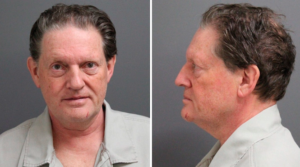 Byron David Smith, 64, was a retired State Department security engineering officer whose home in Little Falls, Minnesota had been broken into multiple times at least half a dozen times during 2012. The thieves had stolen thousands of dollars in cash, the watch his father had received after spending nearly a year as a POW in World War II, medals and ribbons Smith had earned in Vietnam, several firearms, and jewelry. Smith, who was angry that local police had not been able to prevent the break-ins, began wearing a holster with a loaded gun inside his home.
Byron David Smith, 64, was a retired State Department security engineering officer whose home in Little Falls, Minnesota had been broken into multiple times at least half a dozen times during 2012. The thieves had stolen thousands of dollars in cash, the watch his father had received after spending nearly a year as a POW in World War II, medals and ribbons Smith had earned in Vietnam, several firearms, and jewelry. Smith, who was angry that local police had not been able to prevent the break-ins, began wearing a holster with a loaded gun inside his home.
On Thanksgiving, 2012, Smith was at home when he heard people casing his property outside. He took his gun and went to sit in his basement, waiting for six hours to shoot the intruders. He turned on an audio recorder to tape the incident, intending to show he was attacked inside his home (defending your home against intruders is permitted under the state’s “Castle law”). However, the audio tape also picked up Smith’s bitter curses and angry mutterings, including him rehearsing what he was planning to say to police and attorneys after he had killed the burglars (“I realize I don’t have an appointment, but I would like to see one of the lawyers here,” he says at one point).
The intruders were two local teenagers, Haile Kifer, 18, and her cousin, Nicholas Brady, 17, who were being investigated for prior burglaries, including those at Smith’s house. When Brady appears at the top of the basement stairs, we can hear Smith shoot him twice, then we hear Brady fall downstairs and Smith firing again, shooting him in the face and killing him.
Minutes later, we hear Kifer entering the basemen. Smith shoots her at the top of the stairs. She cries out, “Oh my god!” and falls down the stairs. Smith goes to shoot her again, but his rifle jams. He picks up his revolver and fires many times into her chest, then dragged her across the floor and put her body next to that of her cousin, and killed her instantly with a shot to the head. Following the shootings, he mutters, “I am not a bleeding heart liberal. I felt like I was cleaning up a mess – not like spilled food, not like vomit, not even like…not even like diarrhea – the worst mess possible. And I was stuck with it…in some tiny little respect…in some tiny little respect. I was doing my civic duty. If the law enforcement system couldn’t handle it, I had to do it. I had to do it. The law system couldn’t handle her and if it fell into my lap and she dropped her problem in my lap…and she threw her own problem in my face. And I had to clean it up.”
Smith waited until the following day to have a neighbor call police, saying that he did not want to bother law enforcement on Thanksgiving. When interviewed by police, he acknowledged “firing more shots than I needed to,” and and described firing “a good clean finishing shot” into Kifer’s head. This use of excessive force, coupled with the fact that Smith had clearly been lying in wait for the teens, led to his conviction for two counts of first-degree murder. He was sentenced to life in prison, and his appeal denied.
Learn more about the case here.

